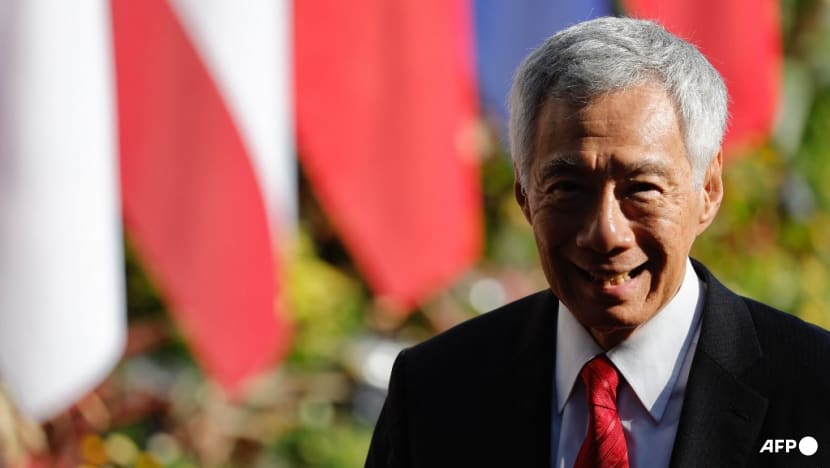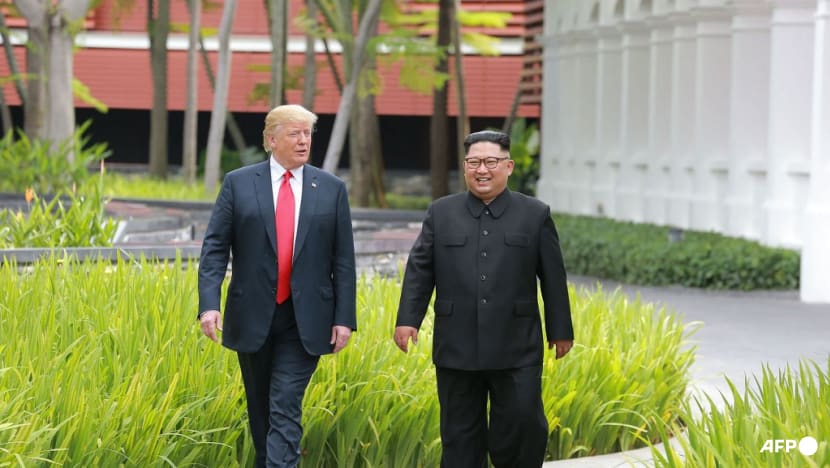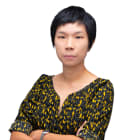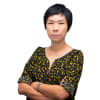Phone calls and photo posts: How PM Lee taps these 'foreign policy' tools to secure Singapore’s interests
Mr Lee Hsien Loong held his own among world leaders while making his overseas work “real” to Singaporeans back home, say foreign affairs insiders who worked with him.

Singapore's Prime Minister Lee Hsien Loong arrives during the Association of Southeast Asian Nations (ASEAN) Summit in Labuan Bajo on May 10, 2023. (Photo: AFP/Willy Kurniawan)

This audio is AI-generated.
SINGAPORE: Former diplomat Ashok Kumar Mirpuri began his United States posting the same year Prime Minister Lee Hsien Loong started his social media accounts.
On the PM’s visits to the US, Mr Mirpuri saw how Mr Lee used his “deep interest” in social media and photography to make his overseas work “real” to Singaporeans back home.
“Every time he’d come to the US, he would take interesting photographs which he would then put out on social media, whether we were in New York, Washington or San Francisco,” recalled Mr Mirpuri, Singapore’s ambassador to the US from 2012 to 2023.
“He wanted to convey to the Singapore audience the bigger world that he had to function in, but make it real for them as well,” Mr Mirpuri told CNA.
It’s not just hard foreign policy, it’s not just going into meetings, dealing with your counterpart … he connects all these things to Singaporeans.”

Closer to home, Singapore’s High Commissioner to Malaysia Vanu Gopala Menon remembers how Mr Lee called his Malaysian, Indonesian and Bruneian counterparts to convey Hari Raya greetings when the COVID-19 pandemic disrupted overseas visits.
Mr Lee “initiated regular phone calls” especially with his Malaysian counterparts, and these efforts led to several travel schemes that facilitated the flow of people across borders during the challenging years: The Periodic Commuting Arrangement, the Reciprocal Green Lane, the Vaccinated Travel Lane, and a lane for those who needed to travel for compassionate reasons.
“It is the cumulation of these modest, personal endeavours that have made a substantive, positive difference to bilateral relations under PM Lee’s leadership,” Mr Menon said.

The anecdotes show how Mr Lee, who steps down as Prime Minister on May 15, responded to new tools and unexpected circumstances on the foreign policy front over his 20 years at the helm, observers and insiders say.
But his tenure was one of continuity and keeping Singapore on a stable course, even in the face of a more complicated global environment and greater strategic competition between big powers, they say.
"BALANCE BETWEEN REALISM AND IDEALISM"
At the 2015 S Rajaratnam Lecture, Mr Lee outlined Singapore’s “fundamental interests” which he said had not changed in the last 50 years.
They are to have peace in the world; to have an international order where countries respect and abide by international law; to establish a network of friends and allies with whom Singapore can work; to have a stable and secure Asia-Pacific region, especially Southeast Asia; and ultimately, to preserve Singapore's sovereignty and right to determine its future.
“Our foreign policy is a balance between realism and idealism,” Mr Lee said, in a speech titled “Choice and Conviction - the Foreign Policy of a Little Red Dot”.
We know we have to take the world as it is and not as we would wish it to be. But we believe that we can and must defend ourselves and advance our interests.”
Two historic meetings Singapore hosted during Mr Lee’s term are often cited as testaments to how the country conducts its foreign policy: The 2015 summit between Chinese President Xi Jinping and Taiwan President Ma Ying-jeou, and the 2018 summit between US President Donald Trump and North Korean leader Kim Jong Un.
The Xi-Ma meeting was the first by leaders from both sides since China’s civil war ended in 1949. China and Taiwan had reportedly requested that Singapore facilitate the talks.

As for the Trump-Kim summit, Singapore was chosen because of its security and neutrality, according to the US. Mr Lee said at the time that the S$20 million (US$14.8 million) spent on logistics and security for the meeting was a price the Republic was willing to pay for a “very important operation”.
Being deemed a suitable host for the summit “says something about Singapore's relations with the parties and our standing in the international community", he added.

As statesman, Mr Lee has also participated actively at major international events such as the Asia Pacific Economic (APEC) Forum, Group of 20 (G20) and World Economic Forum meetings, advocating for an open and inclusive multilateral trading system.
Although not a G20 member, Singapore has been invited to participate in the G20 Summits – gatherings of many of the world’s largest economies – and its related processes every year since 2010, except for 2012.
Mr Bilahari Kausikan, a former diplomat and permanent secretary of foreign affairs, said Singapore’s attendance at G20 Summits is “quite a remarkable achievement for a small country”. The country values the invitation as it provides an opportunity to have a say at a forum that is important, generally, for the world economy, he said.
“We don’t enjoy capering about on the world stage just to cut a fine figure. We do it in order to defend our interests," he added.
Mr Kausikan also appraised how Mr Lee has navigated Singapore amid major developments over the last two decades, which include the 2007-2008 global financial crisis, heightened US-China strategic competition, a more assertive China in the South China Sea and a more polarised US, among others.
“Given all these challenges, I think he kept Singapore on a stable course, kept Singapore attractive as an investment destination, as an economic partner and as a political partner,” he said.
Singapore’s foreign policy developments under PM Lee
2004-2005: The Singapore Armed Forces undertakes its largest humanitarian assistance and disaster relief operation after the Dec 26 Indian Ocean tsunami. PM Lee convenes a special leaders meeting in the aftermath of the tsunami, bringing together ASEAN member states, key partners and international organisations.
2005: The US and Singapore sign the Strategic Framework Agreement, which recognises Singapore as a major security cooperation partner of the US.
2007: Singapore-Malaysia Leaders’ Retreat started by PM Lee and Malaysian PM Abdullah Ahmad Badawi; first meeting is held in Langkawi.
2007: PM Lee chairs the 13th ASEAN Summit in November; ASEAN Charter adopted.
2008: The International Court of Justice awards sovereignty over Pedra Branca to Singapore, and Middle Rocks to Malaysia.
2008: Tianjin Eco-city, the second government-to-government project between Singapore and China, is launched.
2010: PM Lee and Malaysian PM Najib Razak break 20-year deadlock on outstanding issues regarding the Points of Agreement of 1990 on Malayan Railway Land in Singapore. They also agree on a Rapid Transit System (RTS) link to be built between Johor Bahru and Singapore.
2015: Singapore facilitates historic meeting between Chinese President Xi Jinping and Taiwan President Ma Ying-jeou.
2015: Chongqing Connectivity Initiative, the third government-to-government project between Singapore and China, is launched.
2016: Singapore and Malaysia sign agreement to build a high-speed rail (HSR) between Singapore and Kuala Lumpur, with a target to begin services by Dec 31, 2026.
2016: PM Lee makes official visit to the US at the invitation of President Barack Obama to celebrate 50 years of diplomatic relations. A state dinner at the White House caps off the visit.
2016-2017: Nine Singapore Armed Forces Terrex vehicles en route to Singapore from Taiwan after a routine training exercise are detained in Hong Kong for about two months.
2018: Singapore facilitates meeting between US President Donald Trump and North Korean leader Kim Jong Un in June.
2018: The Singapore-KL HSR project is postponed.
2018-2019: Malaysia seeks to take back airspace in Southern Johor that was delegated to Singapore under an agreement with regional states that dates back to 1973. They later reach an agreement to end the months-long dispute, with Singapore halting its instrument landing system procedures at its Seletar Airport while Malaysia is to open up a restricted area near the countries' border.
2018-2019: Malaysian vessels anchor in Singapore's territorial waters off Tuas from December for months; both countries later agree to de-escalate maritime boundary dispute.
2020 onwards: COVID-19 pandemic hits. PM Lee is instrumental in the setting up travel schemes including the Periodic Commuting Arrangement, the Reciprocal Green Lane, the Vaccinated Travel Lane and a lane for compassionate travel.
2021: The HSR project is terminated, with Malaysia compensating Singapore for costs already incurred.
2023: Singapore and China upgrade bilateral relations to an All Round High Quality Future-Oriented Partnership and sign an upgraded free trade agreement.
2024: Singapore and Malaysia sign Memorandum of Understanding on a new Johor-Singapore Special Economic Zone in January.
2024: A set of agreements between Singapore and Indonesia, dealing with air space management, defence and extradition, comes into force in March.
"ANALYTICAL, OPEN-MINDED"
Those who have worked with Mr Lee speak of a detailed, analytical and open mind.
“Once you understood his expectations, his emphasis on proper analysis, his emphasis on quality and also his expectation that your recommendations are in the larger interests of Singapore, then I think he was an easy person to work for,” said Mr Peter Ho, former head of Singapore’s civil service and former permanent secretary for defence and foreign affairs.
Mr Lee’s ability to converse with other world leaders on weighty issues such as the economy and global developments also helped burnish Singapore’s image.

“If you have a leader who can talk about very complex issues and very serious matters at a high level with other leaders, then it helps to reinforce the impression – apart from what Singapore has undoubtedly achieved – of Singapore as a high-performing country (with a) high-performing government,” said Mr Ho. “That counts for a lot.”
Singapore’s former ambassador to China, Mr Chin Siat Yoon, has known Mr Lee since the 1970s when they served in the armed forces. One of his most memorable experiences working with Mr Lee was on Suzhou Industrial Park (SIP), back when Mr Lee was still deputy prime minister (DPM) to Mr Goh Chok Tong.



SIP, the first flagship project between the two governments, was established in 1994 to develop a model industrial township in China’s Jiangsu province. A few years later, the consortium was losing money and local officials had set up a rival industrial park nearby. Then-Senior Minister Lee Kuan Yew said Singapore might “bow out” of the project.
Mr Chin was among those who felt it would be a “bad move” to pull out of SIP, which then-Chinese president Jiang Zemin had called “China’s most important example of bilateral economic cooperation”.
“If you pull out unceremoniously, you diminish it and that’s not good for the subsequent relationship,” Mr Chin said.
“The other thing is, I thought it would not stand us in good stead in the world because, at the time, countries perceived Singapore, and we actually marketed ourselves as the gateway to China … I thought pulling out was too drastic a move.”
There were issues to be resolved, but not by “going to the streets” – and Mr Lee agreed, recalled Mr Chin.
“He’s very open-minded,” said Mr Chin, who was Singapore’s ambassador to China from 1998 to 2012. “If you can make a case, he’s prepared to take in contrarian views.”
Mr Chin said he attended two meetings, one chaired by Mr Lee, who was then-DPM, and another chaired by Mr Goh with then-SM Lee Kuan Yew in attendance.
“After the meetings, there was no more talk about withdrawal,” said Mr Chin.
Singapore instead negotiated for a change in shareholding in 1999 from 65 per cent to 35 per cent, to incentivise the local government to support the project, and reduced its development commitment. The Chinese also changed the leadership in Suzhou during the time both sides were negotiating, said Mr Chin.
By 2001, SIP turned a profit and by 2003, had recouped all its losses.
“That was actually the deepest impression (I have of working with Mr Lee),” said the former ambassador.
"ONE VERY STRONG, INVALUABLE ASSET"
Last year, in what was to be his last National Day Rally as Prime Minister, Mr Lee spoke of an international environment “fraught with geopolitical tension and economic uncertainty”.
Singapore must “navigate carefully in this increasingly troubled landscape” but, “despite the dark clouds, the world still offers many opportunities for those who dare to seize them”, he said.
There are blocs and regions that are increasing in importance and could present new markets for Singapore, experts note.
One is BRICS, a grouping founded by Brazil, Russia, India and China. South Africa became its next member, followed by Iran, Egypt, Ethiopia and the United Arab Emirates this year. “BRICS is going to be a very important development,” said Mr Chin.

Africa and Latin America are growth areas, as are countries along China’s Belt and Road Initiative, said Dr Alan Chong, S Rajaratnam School of International Studies senior fellow. “If you want to keep Singapore relevant, we need to not only be plugged into East Asia and South Asia, we need to go into these so-called new markets,” he said.
The “trick” for Singapore, going forward, is to “continue to make progress and success in areas we are good at and … can value-add to other countries”, said Mr Lye Liang Fook, senior fellow at the ISEAS-Yusof Ishak Institute.
US-China strategic competition is widely expected to continue and, in recent years, Mr Lee has reiterated in interviews that Singapore and Southeast Asia do not want to choose sides between Washington and Beijing.
These are the dynamics that Singapore and Mr Lawrence Wong will have to navigate.
Mr Wong’s runway has been shorter than his predecessors’ – Mr Lee was DPM for 14 years; Mr Wong was appointed DPM in 2022 – but observers note he has visited Europe, China, the US and the region in the past year.
He has shown a “certain comfort level in dealing with diplomatic affairs”, said Dr Chong.

Mr Wong had a “front-row seat” as principal private secretary to Mr Lee from 2005 to 2008, and has worked in the finance and economic sphere for a considerable time.
That has “an inherent international dimension, and that is an increasingly important part of the global international agenda”, said Mr Kausikan.
Mr Wong has participated in every Singapore-Malaysia Leaders’ Retreat since 2014, added Mr Menon.
And with Mr Lee staying on in the Cabinet as Senior Minister, as his predecessors did, there will be continuity.
The role of Senior Minister is well-established in Singapore’s political system, and ensures that an experienced individual remains as a valuable resource to be tapped, observers say.
“The decision-making, the executive authority, of course, rests with the prime minister of the day, as it always has. But it’d be a real pity to lose past experience,” said Mr Kausikan.
“Every leader of course brings a different style to it. But I think the advantage for Singapore is its very strong strand of continuity,” said Mr Mirpuri.
Mr Wong inherits “one very strong, invaluable asset” – a Singapore that’s widely acknowledged to be a success, said Mr Kausikan.
“No political leader, no individual diplomat, however brilliant, can conduct foreign policy if this was a barren rock,” he said.
“If our foreign policy is successful, it’s because Singapore is a successful country. And that’s the work of generations, and it will continue to be a work of generations.”
Additional reporting by Dawn Tan















